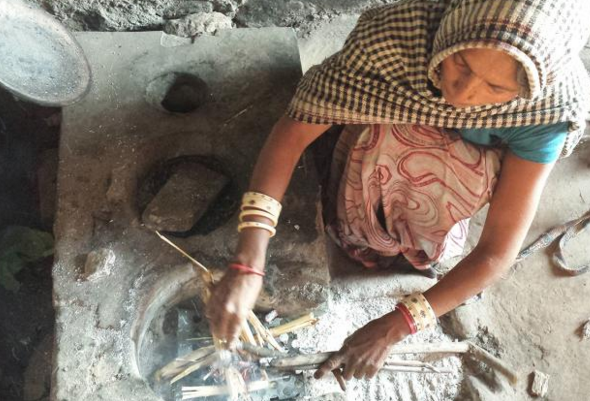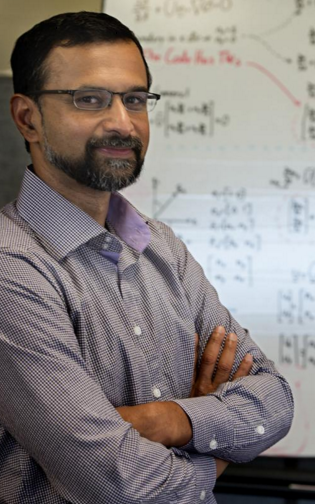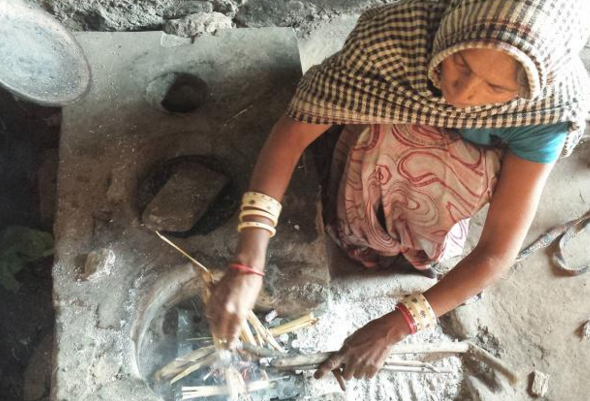BTN.com staff, February 7, 2016
The essence of engineering is problem-solving. And contrary to popular belief, that doesn?t mean finding solutions of intricate mathematical and technological complexity. Often, the best approach is a simple one.
Such is the case with chulha ovens, the traditional method of cooking at home in India. There are two major problems with these ovens: They consume large amounts of wood, and they emit a great deal of carbon, causing severe respiratory problems among the people of India.
 A group of visiting University of Iowa professors and students took it upon themselves to improve this centuries-old cooking technique with a solution that reduced both consumption of wood and pollutants.
A group of visiting University of Iowa professors and students took it upon themselves to improve this centuries-old cooking technique with a solution that reduced both consumption of wood and pollutants.
?[It] started because I took a group of students to look at deforestation,? explained H.S. Udaykumar, an engineering professor at Iowa. ?That was the original plan, to look at the environmental problem. When we got there, [we discovered] a large part of the deforestation happens because of the firewood from cooking.
?I calculated the wood consumption, just for cooking,? he added. ?Basically, they are extracting biomass equal to forest area covered in Texas. Every year. All that carbon goes into the air. Not just carbon, but soot. We wanted to figure out how to stem this problem ? we figured we?d have to go high tech on this.?
An early idea was to provide solar cookers that could store energy. But those can cost hundreds of dollars - well beyond the price point for many Indian communities. Also, the chulha oven has been used for centuries, and about 166 million households in India still cook with it, so it?s not feasible to just do away with it and replace it with something else.

?We pretty much gave up because we just couldn?t figure anything out,? Udaykumar said. ?Then we said, ?Nobody had tried to change what they already have.? We figured out if we just put a grate in there, it allows the embers and ash to separate from the wood.?
The answer turned out to be what?s called a Mewar Angithi, which is basically a metal grate with holes in it that allows air to flow from the wood. It was able to produce a more efficient fire, meaning less soot and smoke output and less wood used.
The total cost? About a dollar.
?It?s absurdly simple,? Udaykumar said. ?You stick it in there, and you get twice as much output from your stove. And it costs next to nothing.?
The best part is that it?s actually getting widespread adoption.
?Six months later, we went back to the villages to see if they?re using it or not,? Udaykumar said. ?We didn?t expect much. It turns out they love it. We had close to an 80 percent adoption rate. And they?re coming up with their own ways of using it. It?s like it was always there.?
Engineering grad Allison Kindig went to India twice with Udaykumar, working closely with him on the project. She?s amazed by how well the simple solution works, but is always looking for the next best way to improve living there.
?For us, this incremental technology right now is the best solution,? she said. ?And I say ?right now? because we?re always looking for something better. Solar could still be a solution. But when you find out there are constraints, it complicates things.?
For now, Udaykumar is looking into the next generation of oven inserts. He says they could get better, and even cheaper.
?The idea is to make it out of mud,? he said. ?We?re trying to connect with local potters. The idea is to make the potters build these things. It would cost pretty much zero.?
They have also made trips to Africa to work with communities in Ghana and Kenya. The devices have been well-received there too, and plans are already in the works to develop ways to distribute them.
[btn-post-package]When all is said and done, the group from Iowa could have a significant impact on both the environment and millions of people across the world. And all this comes from the simplest of solutions. The irony of that isn?t lost on Kumar.
?We started out trying to come up with the most complex thing, and it was a total failure,? he said. ?I have all this expertise, these Ph.Ds., blah blah blah. It was just this simple thing. It?s amazing nobody has come up with this before. It makes you feel good, but it also makes you feel silly.?
By Matthew Wood







